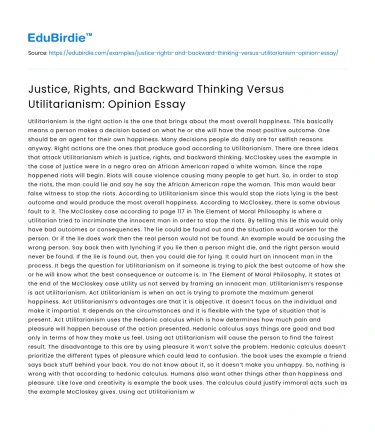Introduction
The philosophical debate between justice, rights, and utilitarianism has long been a subject of intense scholarly discussion. Justice and rights are often seen as bedrocks of moral and legal reasoning, emphasizing individual entitlements and fairness. In contrast, utilitarianism, a consequentialist ethical theory, advocates for actions that maximize overall happiness and minimize suffering. This dichotomy raises pertinent questions about the moral frameworks that should guide society. Should individual rights hold precedence, or should the greater good be the ultimate goal? This essay explores the tensions and intersections between these paradigms, examining how they manifest in real-world contexts. By analyzing the strengths and limitations of each approach, this essay aims to illuminate the complexities involved in balancing justice and rights with utilitarian considerations, ultimately arguing for a nuanced synthesis that respects both individual entitlements and collective welfare.
Justice and Rights: Foundations and Challenges
Justice and rights are fundamental concepts in moral and legal theory, forming the basis of democratic societies. Justice, often equated with fairness, involves the equitable distribution of resources, opportunities, and privileges. John Rawls, a key figure in this discourse, posits in "A Theory of Justice" that a just society is one where institutions are designed to benefit the least advantaged members. His "veil of ignorance" thought experiment suggests that decisions about justice should be made without knowledge of one's own social status, promoting impartiality and equality (Rawls, 1971).
Save your time!
We can take care of your essay
- Proper editing and formatting
- Free revision, title page, and bibliography
- Flexible prices and money-back guarantee
Rights, on the other hand, are entitlements that individuals possess, protecting them from infringement by others, including the state. The Universal Declaration of Human Rights (UDHR) enshrines rights such as freedom of speech, assembly, and religion, emphasizing their inalienability. However, the application of rights is not without challenges. Conflicts arise when rights are interpreted differently across cultures or when the exercise of one person's rights impinges on another's. For instance, the right to free speech may conflict with the right not to be harmed by hate speech.
Despite their foundational role, justice and rights face criticism for their perceived rigidity and potential to overlook broader social outcomes. Critics argue that focusing solely on individual rights can lead to social fragmentation and neglect of collective welfare. This critique sets the stage for the utilitarian perspective, which emphasizes outcomes over processes and rights.
Utilitarianism: Maximizing the Greater Good
Utilitarianism, championed by philosophers like Jeremy Bentham and John Stuart Mill, is predicated on the principle of utility, which advocates for actions that achieve the greatest happiness for the greatest number. This consequentialist approach evaluates moral decisions based on their outcomes, rather than adherence to predefined rights or duties. Bentham famously quantified happiness through a "felicific calculus," aiming to measure the pleasure and pain resulting from actions (Bentham, 1789).
The appeal of utilitarianism lies in its flexibility and focus on tangible outcomes. In public policy, for instance, utilitarian principles often guide decision-making, such as allocating limited healthcare resources to maximize overall health benefits. During the COVID-19 pandemic, many governments adopted utilitarian approaches, prioritizing lockdown measures to minimize overall harm despite infringing on individual freedoms.
However, utilitarianism is not without its critiques. Its focus on aggregate happiness can lead to the neglect of minority rights and justify morally questionable acts if they result in a net increase in happiness. The "trolley problem," a philosophical thought experiment, illustrates this dilemma: should one sacrifice a few to save many? Critics argue that such reasoning can lead to moral compromises that violate fundamental rights, highlighting the need for safeguards against the tyranny of the majority.
Bridging the Divide: Towards a Coherent Ethical Framework
The tension between rights-based and utilitarian approaches necessitates a nuanced ethical framework that integrates elements of both. One potential synthesis is found in the notion of "rule utilitarianism," which suggests that adherence to rules that generally promote the greater good can reconcile individual rights with utilitarian goals. This approach acknowledges the importance of stable rights while allowing for flexibility in exceptional circumstances.
Real-world examples illustrate this balance. In environmental policy, rights to property and economic development must be weighed against the utilitarian goal of preserving ecosystems for future generations. The Paris Agreement on climate change exemplifies this negotiation, as it seeks to balance national interests with global environmental welfare.
Furthermore, adopting a "capabilities approach" as advocated by Amartya Sen and Martha Nussbaum can enhance this synthesis. This approach emphasizes expanding individuals' capabilities to achieve well-being, thus respecting both individual rights and collective welfare. By focusing on what individuals can do and be, it transcends the limitations of both rigid rights-based and purely consequentialist frameworks.
Conclusion
In conclusion, the discourse on justice, rights, and utilitarianism highlights the complexities of ethical decision-making in contemporary society. While rights and justice emphasize individual entitlements and fairness, utilitarianism focuses on maximizing overall happiness. Both frameworks offer valuable insights but also present challenges when applied in isolation. A coherent ethical approach requires balancing these perspectives, recognizing the importance of individual rights while considering the broader social outcomes. By integrating rule utilitarianism and the capabilities approach, societies can navigate the moral landscape in a way that respects both individual dignity and collective welfare. Ultimately, achieving justice in a pluralistic world demands flexibility, empathy, and a commitment to balancing competing ethical demands.






 Stuck on your essay?
Stuck on your essay?

